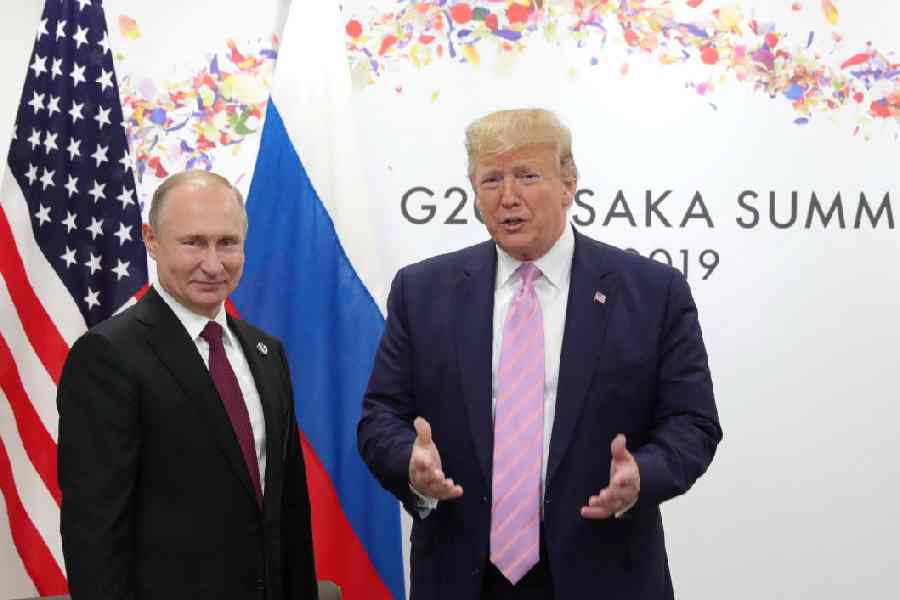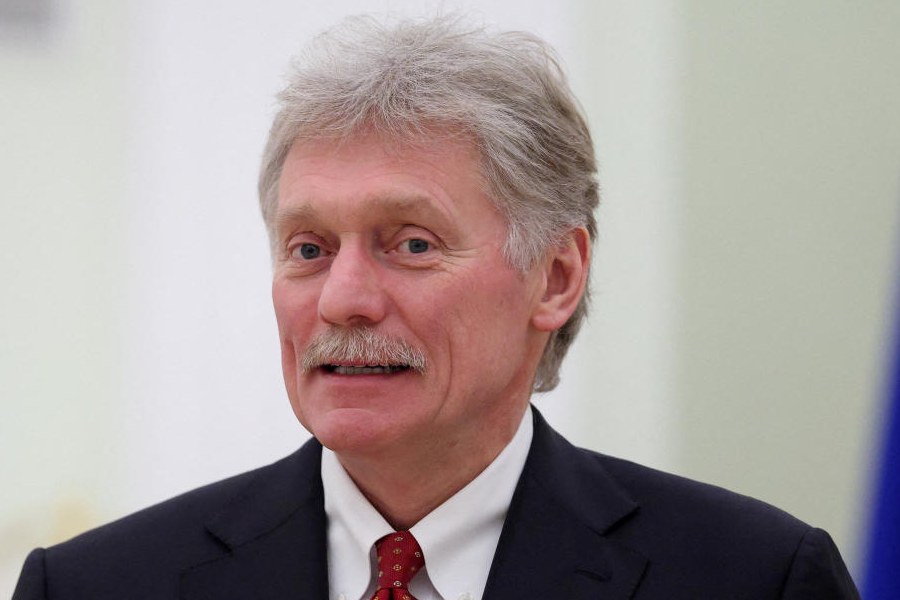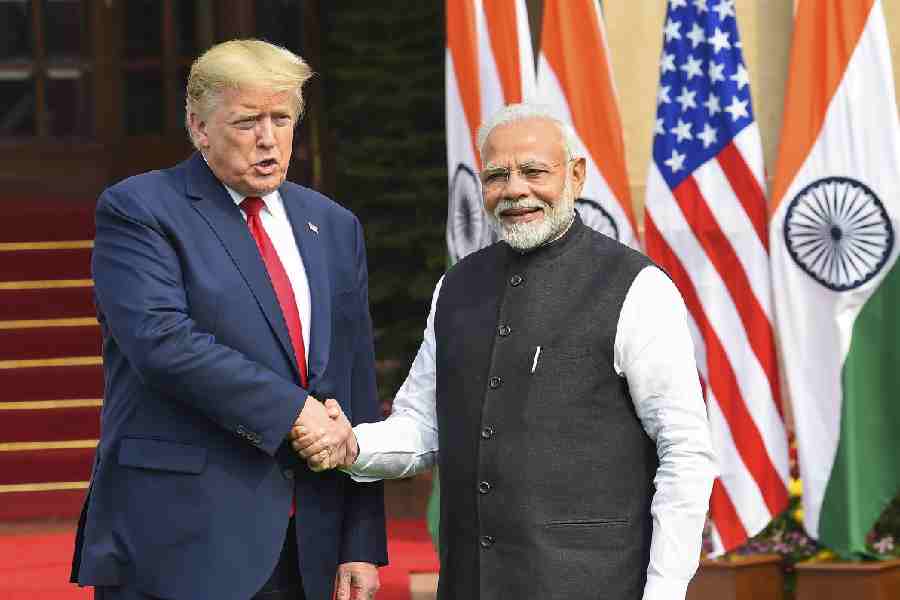It is much more than the vexed question of a glass being half full or half empty. Since Donald Trump assumed charge as president of the United States of America on January 20, the world has not merely been turned upside down; the very assumptions on which political morality rested have been redefined. The well-entrenched political Establishments in the world’s capitals that had hitherto comforted themselves into believing that elected governments were transient while they epitomised understated permanence are now in a state of panic. Trump’s unbelievably rapid (yet incomplete) counter-revolution has forced the contemporary version of men in grey suits into undertaking voyages of complete uncertainty. When and if they ever return, it is doubtful they will still be the Establishment.
The panic is most visible in Europe. Since the 2007 Treaty of Lisbon initiated the process of transforming the European Union from an economic community to a supra-State that undermined the sovereignty of national legislatures, the trans-Atlantic alliance had begun to assume a definite post-Cold War shape. Once the naïve assumption that Russia would redefine itself as a liberal social democracy had been discarded following the advent of Vladimir Putin, the EU was engaged in a process of enlarging its geographical scope. Riding on the back of the EU was the North Atlantic Treaty Organization that aimed to ensure that the post-Soviet truncated Russia became a permanent arrangement. Predictably, this was not to the liking of the nationalists that had acquired control of the Kremlin.
Ironically, it was the overarching liberal evangelism of the EU that came to the unwitting assistance of Russia. In line with its lofty self-image as the global upholder of goodness, the unelected bureaucracy running the EU rode roughshod over national sentiments. The mass acceptance of asylum seekers from conflict zones in North Africa, the Middle East and Afghanistan that was triggered by the generosity of the former German chancellor, Angela Merkel, in 2015 was not universally applauded by all Europeans. Read along with pre-existing disputes over sovereignty and the power of the European Court of Justice, mass migration was the immediate provocation behind the United Kingdom’s departure from the EU in 2016. In Hungary, Prime Minister Viktor Orbán became the focal point of the resistance among central European powers to the multicultural evangelism of the EU. In western Europe and Scandinavia, the beginnings of a nativistic backlash against non-European immigration were all too visible. In their arrogance, the Eurocrats debunked the flashpoints of national resistance as either fascism or a function of Russia-sponsored manipulation.
Putin’s invasion of Ukraine was a bid to prevent the presence of both the EU and the NATO on the borders of Russia. It may have also been prompted by irredentist impulses that viewed Ukraine as an integral part of Mother Russia. Whichever way the invasion of February 2022 is viewed, it gave NATO a golden chance of waging a proxy war against Putin. With President Volodymyr Zelensky of Ukraine seizing the opportunity to project his country as today’s version of the beleaguered Republican Spain of the mid-1930s, the Ukraine war became an excuse for Europe to repackage its goodness to the world. Since this Russophobia wasn’t entirely shared by the nationalist parties in Europe, the Ukraine war was also an occasion to flaunt the trans-Atlantic alliance as the wholesome alternative to those forces supposedly favouring autocracy.
It is apparent Trump has upset the apple cart. If the US decision to not name Russia as the aggressor in Ukraine at the United Nations General Assembly vote this week is any indication, the charge that the US has changed sides is not without basis. However, assuming that Trump’s supposed bonhomie with Putin isn’t based on ideology, why has the US chosen to leave its European allies in the lurch?
The reason is, predictably, grounded in a cost-benefit analysis of the conflict. While Kyiv will not crumble if the full weight of NATO is behind it, it is also apparent that the European boast of inflicting a defeat on Russia is empty boast. As of now, despite Russia enjoying a nominal advantage, the war of attrition is likely to be both bitter and inconclusive. For Trump, looking in any case to rationalising America’s global involvements, this implies pouring money down a bottomless pit. The demand that European nations chip in with defence budgets that exceed 2% of the GDP is unlikely to be met if Europe feels that its grandeur can be bankrolled by the US using the commonality of values as the grand cover. The biting indictment of the US vice-president, J.D. Vance, of the sheer one-sidedness of Europe’s ‘official’ democracy, particularly the ruling elite’s disavowal of those who raised concerns over immigration, was the first clear signal by the new Trump dispensation that the cosy relationship was starting to be frosty. Trump followed it up with his tirades against Zelensky, the “modestly successful comedian”.
For the moment, European leaders have reacted intemperately to Trump’s clear message against becoming a hostage to their maximalist agenda. Friedrich Merz, the man likely to become chancellor after last Sunday’s German election, has indicated a need to forge a European alliance that can live outside the shadow of America. Keir Starmer has repeated this mantra and even made an offer to position British troops on the Russia-Ukraine border. But will this be affordable to the beleaguered British taxpayer or acceptable to Moscow?
On his part, Trump has told President Emmanuel Macron of France that Putin won’t mind if European troops police a demilitarised zone on the Russia-Ukraine border. But there seems to be zero consensus on what should constitute the national borders. If the pre-2022 borders are accepted, it will be tantamount to an emphatic victory
for Zelensky. However, this will be totally unacceptable to Putin who will insist that the Russian-speaking provinces of Ukraine join the Crimea in becoming an integral part of Russia. As of now, it seems that Trump is on the side of Putin.
This implies that when the US makes its position clear, there will be a round of tantrums in the rest of Europe, with some members of the commentariat equating the accommodation of Russia with the sellout of Czechoslovakia in Munich, 1938. Alas, drawing comparisons with the appeasement of Hitler is unlikely to impress Trump who will insist that the alternative to Europe rebuffing him is the total withdrawal of the US from NATO’s funding. A reset of the terms of the US engagement in NATO seems imminent. What is uncertain is if this rejig leads to a new cosiness between US and Russia, a move that could have a fallout on Sino-Russian relations. Trump is always accompanied by permanent uncertainty.










